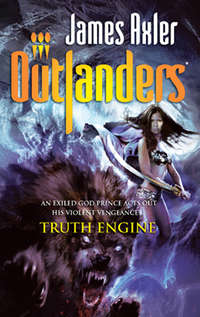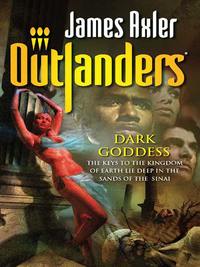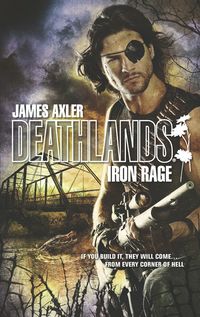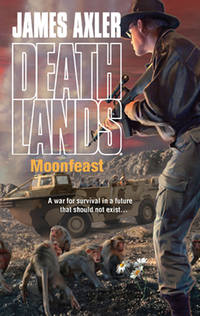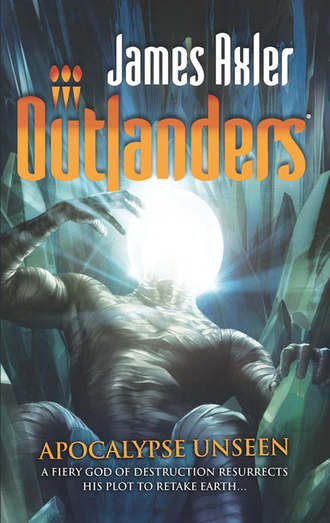
Полная версия
Apocalypse Unseen
The corridor was lit by a single candle at the far end, held in the claws of a four-foot-high holder, its silver base emerging from the half inch of water that covered the floor here, just as it did in the motor pool.
Nathalie followed the corridor to its end, and as she approached the room there, she could smell the incense on the air, masking the other scents of damp and sweat and death.
This room was much smaller, barely able to contain the towering metal-walled tank that dominated its space. The sound of the generator was louder in here, too, a great thrumming that seemed to thump through the metal plates of the floor, pounding against the soles of Nathalie’s boots so that it seemed she was shaking, that her heart was racing.
The room was lit—almost reverently—by a dozen candles, each one as tall as a child’s arm and propped inside mismatched containers—jars and cups, here the jaws of a monkey’s skull as if it was smoking a lit cigar. There was no water in this room, though its floor was stained dark where water had seeped in before. A lone figure sat in the center of the room, facing the towering structure that dominated the space. He sat not in a chair but in a wheelchair, his back to Nathalie. This was Papa Hurbon, a corpulent figure with wide shoulders and richly dark skin. His head was shaved and shaped like a bullet, a bucket-wide jaw tapering upward to a point at the top of his skull. Earrings dotted his ears, twin lines of gold studs running up their shell-like curves, tiny figures suspended from the lobes themselves.
Clutching something small and ragged like an old woman’s knitting, Hurbon’s eyes were wide as he looked at the vast generator that was housed in the room. The unit towered over Nathalie, its curved metal sides buckled in places where something hard had struck them, a single porthole of six-inch armaglass located in the lone door that dominated its front. This was a cold-fusion generator, designed in the late twentieth century to create energy through nuclear fusion and used to power this underground redoubt when it had been in the possession of the US Army two hundred years ago. A spectral light ebbed from that single porthole, its luminescence a pale, irradiated blue.
“Nathalie,” Hurbon said without turning.
Nathalie bowed her head in deference to Hurbon, even though he had not turned to see. “My beacon, my guide,” she said, her voice shrill in the enclosed space.
She waited then, as Papa Hurbon, leader of the société, master of the djévo, practitioner of the dark voodun arts of the Bizango Priests, studied the ghostly miasma that swirled and flowed across the glass of the cold-fusion generator. There was a face there, the hint of an eye as hollow as the grave, a smile half formed from mist, strands of hair that swept across cheekbones that never fully formed as they were tossed by the ceaseless winds of the generator. Nathalie had never really understood what the thing in the generator was, only that Papa Hurbon regarded it with unmatched reverence.
“I have been t’inking,” Hurbon began without turning his gaze from the ghost in the window, “about what it is to be immortal. Is it a gift? Or is it a curse?”
Nathalie waited as Hurbon seemed to ponder his own philosophical question. She was not given to philosophy; rather, she was young and the blood still ran hot inside her, driving her to action, not to rumination.
“And so I have thought, back and forth, on this topic,” Hurbon continued after a long pause, “and I have concluded that the key to immortality lies here, in the conquering of death.” He opened his hands, bringing forth the little figure that he clutched there. The figure was a fith-fath, what the ignorant called a voodoo doll, and its twisted rag body depicted a woman’s figure with dark eyes and long, skeletal limbs. “But to conquer death, you see—that is a challenge that few can comprehend. Because to conquer it is to embrace it as my goddess, Ezili Coeur Noir, embraces it.”
He was talking about the figure in the generator, Nathalie knew, a by-product of the Annunaki wombship that had somehow been granted a second life, one fractured into separate bodies, broken away from the wheel of life and death and rebirth. Nathalie did not know the full story, had only pieced together hints of it from what her priest, Hurbon, had told her. When he was a younger man, Ezili Coeur Noir had appeared on the Earth amid the debris of a spaceship that had been destroyed outside of the atmosphere. But, driven mad by the damage that the accident had inflicted upon her body, she had come to the société’s temple in the Louisiana swamps and demanded blood sacrifice. That sacrifice had been wild and desperate and had involved dancing and fornication and, ultimately, the shedding of limbs in her name. Papa Hurbon had lost his legs to his goddess in those crazy days of debauchery, and in return she had brought him a brief taste of paradise as she set about eradicating all life on Earth. Her plan had failed when a group of self-designated protectors of humankind called Cerberus had intervened, petitioning Hurbon’s aid before forcing the broken aspects of Ezili’s body to combine in the heart of the fusion generator. Hurbon had helped, employing his arcane knowledge to draw the fractured aspects of Ezili’s body to one location. And, in so doing, he had gained a hold on Ezili Coeur Noir, weaving her spirit into his fith-fath and so momentarily controlling the uncontrollable. She was unstable even now, locked inside the generator, but at least she was where Hurbon could contain her.
“Death must be bypassed,” Hurbon continued, “and to do that we must first embrace it.”
“Do you...intend to kill yourself, Papa?” Nathalie asked, her tone wary.
Hurbon turned to her at last, a golden canine tooth in his top jaw glinting in the flickering candlelight, dark gaps in his lower jaw where other teeth were missing entirely. “That would be foolish, Nathalie child,” he said with that easy smile of indulgence. “Even if I gained immortality, using the dragon’s teeth, what would that be worth if I lost myself in the process? No, we have tested the teeth in Spain, in Italy, in the Congo—”
Nathalie inclined her head, stopping Hurbon in midspeech. “I am still awaiting the results of the Congo test,” she said.
“Where the locals see Heaven’s Light,” Hurbon muttered to himself, shaking his head sorrowfully. Then he looked up at Nathalie once more, piercing her with his dark-eyed stare. “To keep oneself...well, there are risks, as we have seen. Ereshkigal failed, the body never fully holding. Charun and Vanth failed, their portal collapsing.”
“And them with it,” Nathalie interjected.
“The risks of using the dragon’s teeth have been made clear,” Hurbon said, “and can be bypassed with a little patience. There is just one risk left. And to counter that I shall need someone from the société, someone loyal.”
“I know just the person,” Nathalie assured him, thinking of a desperate member of his parish whose loyalty was beyond question.
“Bring them,” Hurbon instructed, “and together we shall spring the trap that brings Cerberus down forever and grants us immortality and eternal reign over this beautiful mud ball we call Earth.”
Chapter 2
Brigid Baptiste awoke with a start.
The sounds of the Cerberus redoubt filtered through the walls and door of her private apartment, faint but offering a reassuring background, reminding her that life goes on. The apartment was located on one of the upper levels, away from the operations rooms, testing labs and other facilities housed within the redoubt, an old military complex that dated back to before the nukecaust and had been retrofitted to accommodate the Cerberus operation.
It was usually quiet here, whatever the time was. The staff at Cerberus worked in shifts, and people respected that someone was always sleeping no matter what hour of the day it was. But the sounds of talking, of laughter, seemed to echo through her door today.
Brigid shifted, turning onto her side and reaching for the lamp. She squinted her eyes as she brushed the lamp’s side, switching it on with her touch. Beside the lamp, the notebook she kept at her bedside had been moved. Brigid had an eidetic memory, one that was photographic, and it remembered details like that. The book had been rotated twenty degrees from where she had left it. Her incredible memory could make her a little precise sometimes in the things she did.
She was a beautiful woman in her late twenties with an athletic body and long locks of red hair that curled past her shoulders to a point midway down her spine. Her eyes were emerald green, bright with a fire of curiosity. Her assessing gaze suggested a voracious intellect, while her full lips promised passion; Brigid was indeed intelligent and passionate and much more besides. An ex-archivist from Cobaltville, she had been expelled from the ville when she had helped uncover a millennia-long conspiracy designed to subjugate humankind. The conspiracy dated all the way back to the presence on Earth of the alien race called the Annunaki, who had posed as gods from the heavens and been worshipped and adored by primitive humans. Their intrigues had become legend, their infighting the basis of many of humanity’s myths—but the Annunaki were all too real. Brigid could assure you of that fact because she had been there when they had returned to the Earth in the care of their dragon-like wombship, Tiamat, and been reborn to subjugate humankind once more. They had failed, not in the least due to the concerted efforts of Brigid and her companions in the Cerberus organization, a military-style group dedicated to the protection of humanity and its freedoms.
Brigid had joined Cerberus after her expulsion from Cobaltville along with two disgraced Magistrates called Kane and Grant, and a feral child called Domi who had been living as a sex slave for a beast called Guana Teague. Their lives had moved on an awfully long way from that early meeting.
Brigid reached for the notepad, saw in that instant that there were words written upon it. She turned the pad slowly, looking at the words. There were two words—“emit part”—written in her hand, albeit shakily. The words were written not on a line but in a circle, like so:

Automatic writing, Brigid realized as she looked at the strange words, presumably written without conscious thought while she was asleep. Well, that was new.
But what did it mean? Obviously, something had disturbed her in the night; something had caused her to write those words on her notebook, an item that often seemed a redundant indulgence when her memory was such a keen tool and yet could sometimes elicit the answer to a nagging problem from the day before. After all, what would a woman with a photographic memory ever need to write down?
She lay in bed, the covers pulled up high to stay warm, holding the pad and gazing at the topmost sheet.
Emit part.
It meant nothing to her. What was the part? What did it emit? It was dream writing, the kind that adheres to the logic of the subconscious, whose meaning is lost when the waking mind takes over.
Brigid held the pad before her, stared at the letters until her eyes lost focus and stared beyond it into the whiteness of the page, turning the letters into a blur. From outside her suite, Brigid heard familiar voices raised in a friendly discussion peppered with joyful laughter, but the sound barely registered on her consciousness.
Eventually, she set down the pad, pushed back the covers and got out of the bed. The new day awaited, whatever it might bring.
Chapter 3
Kane stepped out of a window in quantum space and into a hail of bullets. He stumbled back under the assault, shouting a command to his three partners before they, too, emerged from the interphase gateway that had materialized in thin air behind him amid the ruins of the Turkish fort.
“Abort the mission!” Kane shouted as his partners stepped out of the quantum ether amid a multicolored swirl laced through with lightning forks. Even as he spoke, he felt the passage of a bullet burn like hellfire across his right bicep, channeling a lance of white-hot pain through his arm.
Behind him, the same bullet—or maybe another from the same source, since it was impossible to be certain amid the hail of gunfire—slammed against the shining surface of the interphaser unit in a shriek of rending metal, sending out a shower of sparks and shattered plating in its wake.
Kane saw the quantum window collapse on itself at that moment, two conjoined cones of multicolored light streaked through with witch-fire lightning, disappearing in the space of a heartbeat, even as his partners stepped from their impossible depths.
The quantum gateway had been generated by the interphaser, a highly advanced device that used a hidden web of pathways across the globe and beyond to move people and objects great distances—even as far as other planets in the solar system—in the blink of an eye. Utilizing principles laid out by an ancient star-born race of aliens, the interphaser was a portable teleportation device which tapped into a network of so-called parallax points to deliver its users to their selected destination. Parallax points were widespread but not infinite, and as such their locations enforced their own strict limitation on where a user might travel—as one could only travel to and from a specific, designated parallax point, not create one at will. These parallax points had often become sites of religious and spiritual interest as primitive man sensed the strange forces contained within them. However, while the interphaser gave Kane and his Cerberus teammates an incredible measure of freedom in their travels across the globe, there was one very obvious problem with any teleportation system, one writ large as life before Kane’s eyes as he dived to the ground with the burn of the bullet stinging against his arm: you just never knew what you were materializing into.
“Down!” Kane cried, slamming against the sandy dirt as the roar of gunfire continued all around him, bullets riddling the ground like rain in a monsoon.
Kane and his partners had emerged in the ruins of an ancient fort, roughly sixty miles south of the Mediterranean Sea in the part of the African continent known as Libya. The fort had no doubt been impressive in its heyday, but now it looked like a scattering of sand-colored slabs—some significantly larger than a Deathbird helicopter—sprawled across the sandy scrub of the Bir Hakeim Oasis. The stones reminded Kane of a graveyard, its gravestones created in colossal proportions as if to mark the passing of titans. Appropriate, perhaps, as the place was yet another reminder of how much of history seemed to have been lost with the nukecaust two hundred years before.
There was a wide crack running through the center of the dilapidated compound, twelve feet across at its widest point and deep enough that its sides disappeared into stygian darkness, even under the relentless brilliance of the midafternoon sun. That sun was obscured by dark cloud cover intermingled with the dense smoke of explosions.
There were at least eighty other people here, Kane guessed as he rolled out of the path of another hail of bullets, one hand clapped against the sting of his arm. Two groups—tribes, gangs, armies, call them what you will—using the ruined fort for cover as they traded bullets from automatic weapons, the sound of gunfire like a thunderstorm echoing across the fallen stones and beyond.
The place had been the site of a Turkish fort a long time ago, back when state borders and ethnic groups mattered, before the nuclear holocaust had rewritten everything in the wink of an eye. It was estimated that 90 percent of the world’s human population had died in the scant few moments that had constituted the nuclear war, and even though two hundred years had passed since those retina-searing bombs had dropped, it seemed that humankind was still striving to recover.
One of Kane’s partners—Brigid Baptiste—was shouting to be heard over the roar of the conflict. “The interphaser’s compromised,” she said. “It’s not respond—”
Another roar of gunfire cut across Brigid’s words, a line of dust plumes accompanying each cough as bullets drilled into the ground all around her. Beside her, another woman—older, with a lean frame and short, dark hair that showed a few traces of gray—wove through the barrage, crouched down and closed her eyes, covering her head with her hands. This was Mariah Falk, a geologist for the Cerberus organization who, unlike the others, was inexperienced in combat situations.
“Get your head down!” the fourth member of the team—a gigantic, dark-skinned man called Grant—yelled, scooping Mariah up in one of his mighty arms and part lifting, part throwing her out of the line of fire. As he did so, another swarm of bullets came lunging through the air, drilling into the dirt and rattling against the chrome sides of the interphaser where it waited on the ground. As they struck, Brigid leaped in the opposite direction, diving for cover behind something that looked like a fallen obelisk.
The world seemed to spin around Mariah as Grant released his grip on her. Still moving, she seemed for a moment to dance toward the cover of a fallen stone archway that, even in its ruinous state, still loomed twice the height of Mariah herself. Then she slammed against it, back and shoulders striking it in a solid thump accompanied by a woof of expelled air from her lungs. She wore a camo jacket like the others, pants and hiking boots, and she had a leather satchel hanging behind her, its strap stretching in a diagonal line across her chest and back. Mariah was slight of frame and, though not conventionally pretty, she had an easy smile and a kindly way that put most people at ease. Right now, however, neither her easy smile nor her homespun charm were likely to help save her life. Instead, she took deep breaths and tried to hold down her breakfast as a drumbeat of bullets caromed off the other side of the stone archway she was pressed against. It was cover—scant but holding—and she knew it was the only thing keeping her alive in those frantic, heart-stopping moments. How did the others cope with this as part and parcel of their everyday lives? she wondered.
Grant scrambled out of the path of the bullets, darting past Mariah and ducking down behind the far side of the collapsed archway. “What the hell did we walk into?” he shouted, raising his voice to be heard over the cymbal crash of bullets.
Grant was a tall man with a muscular body and mahogany skin, his head was shaved and he sported a goatee. An ex-Magistrate in his midthirties, Grant was dressed in a camo jacket similar to his partners’, though it did nothing to disguise his hulking proportions, as well as a Kevlar duster. As Grant scrambled out of the line of fire, it was hard to miss the sheer power that was contained within his well-defined muscles—there was not an ounce of fat on his whole body.
“Don’t know,” Kane answered through clenched teeth, still pressing one hand against his arm where the bullet had glanced off his protective shadow suit, his back against a half-collapsed wall a little way from his partner. “Some kind of local trouble by the look of it.”
Kane was a tall man in his early thirties with broad shoulders and rangy limbs. His dark hair was cropped short and his eyes were the gray-blue color of steel. An ex-Magistrate like Grant, Kane wore a light jacket—desert camouflage colors—that reached down past his waist and featured a dozen pockets of various sizes, light-colored pants and calf-high boots whose leather had the satisfying creases of shoes that have been worn in. Beneath this, Kane wore another layer of clothes, the black all-in-one body glove known as a shadow suit, and it was this that had deflected the 9 mm bullet that had grazed his arm like an angry wasp when he’d stepped from the interphase window. Constructed from a superstrong nanoweave, the shadow suit was a skintight environmental suit that could regulate the wearer’s body temperature, even in extremes of heat and cold. While it was not bulletproof, the strong weave could repel blunt trauma and deflect small-caliber bullets, minimizing injury. Right now, Kane’s arm burned where the bullet had struck a glancing blow, but its full impact had been reduced thanks to the armor-strong weave of the protective suit.
There was something of the wolf about Kane, both in his rangy, loping strides and his personality, for he could be both a loner and pack leader, depending on circumstance. Right now he was here as an operative of Cerberus, the outlawed organization that dealt in the esoteric, with a particular emphasis on protecting humankind from the hidden forces, human and alien, that seemed always arrayed against it. Together with Grant and Brigid, Kane formed one-third of Cerberus Away Team—or CAT—Alpha.
Between Kane and his partners was the interphaser, its square base and pyramidal sides now dotted with the impact of bullets so that it looked as if some carnivorous creature had sunk its teeth into it. Brigid was staring at it from her own hiding place behind a fallen obelisk of stone that lay close to the mighty rent in the ground.
“How do we get out of here now?” Brigid asked, reaching for the weapon holstered at her hip. She was dressed in a similar camouflage outfit to the others. Theirs was a noble pursuit, but sometimes it seemed that walking into a hail of bullets was a too-frequent part of the job. Almost as though to illustrate this, Brigid unholstered the TP-9 semiautomatic that she habitually wore at her hip, unlocked the safety and scanned their surroundings with alert eyes. The TP-9 was a bulky hand pistol finished in molded matte black with a covered targeting scope across the top. “Well?”
“Don’t ask me,” Kane spit, ducking his head down as another volley of bullets came hurtling past overhead. “I’m fresh out of ideas. Besides, I thought you were the brains of this outfit, Baptiste!”
Brigid glared at him. “Brains, yes. Miracle maker—that’s your department, I believe.”
“Yeah,” Kane agreed. “Belief will get you a miracle, all right.” As he spoke, he performed a long-practiced flinch of his wrist tendons. The maneuver activated the catch on a holster located on the underside of Kane’s forearm, commanding a retractable blaster to his hand from its hiding place beneath his jacket’s sleeve. Kane’s weapon was a fourteen-inch-long automatic pistol called a Sin Eater, a compact hand blaster able to fold in on itself for storage in the hidden holster. The weapon was the official sidearm of the Magistrate Division, and his carrying it dated back to when Kane had still been a hard-contact Mag. The blaster was armed with 9 mm rounds and its trigger had no guard—the necessity had never been foreseen that any kind of safety features for the weapon would be required, for a Mag was judge, jury and executioner all in one, and a Mag’s judgment was considered to be infallible. Thus, if the user’s index finger was crooked at the time the weapon reached his hand, the pistol would begin firing automatically. Kane had retained his weapon from his days in service in Cobaltville, and he felt most comfortable with the weapon in hand—its weight was a comfort to him, the way the weight of a wristwatch feels natural on a habitual wearer.
Back pressed tightly to the wall, Kane poked his head above the edge of the sand-colored bricks and scanned the area. There were people moving in all directions, some in groups, some alone, all of them armed. Some were dressed in semi-military uniforms, cobbled-together outfits that created a ragtag kind of uniformity. Others wore civilian clothing that looked like a cross between a long coat and a woman’s nightdress. All of them were scrambling through the ruins and blasting at one another with a wide variety of weapons. Someone must have seen the interphase window open and figured it for a bomb or a rocket launch or something—with the place full of hair-triggered nut balls the way it was, it was little wonder, Kane concluded, that someone had tried to blast the interphaser to smithereens.



